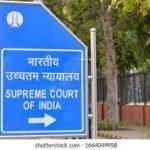The cases revolve around the recruitment process for posts like Sub-Inspector (SI) Civil Police, Platoon Commander, and Fire Officer for the year 2020-2021.
1.Mohit Kumar (Lead Appeal): Mohit applied for Sub-Inspector, Civil Police, and scored 313.84 marks. He was not selected because he did not submit his OBC certificate in the prescribed format, leading him to be considered under the general category, where his marks (313.84) were below the cut-off (316.11). His representation and subsequent writ petition to the High Court challenging this rejection were dismissed.
2.Kiran Prajapati (Connected Appeal): Kiran applied for Sub-Inspector (SI) Civil Police and scored 287 marks. She was also rejected because her OBC certificate was not submitted in the prescribed format. While a single judge of the High Court initially allowed her writ petition, directing the recruitment board (UPPRPB) to accept her certificate, the Division Bench of the High Court subsequently dismissed the appeal filed by UPPRPB, thereby confirming the single judge’s order. The State of Uttar Pradesh then became the appellant in the Supreme Court, challenging this favourable order for Kiran.
Both cases hinge on the rejection of candidatures due to the submission of OBC certificates not in the exact format prescribed by the recruitment notification.
Laws Involved The judgment primarily interprets and applies regulations concerning public employment and reservations:
- Uttar Pradesh Police Recruitment and Promotion Board (UPPRPB): The authority responsible for the recruitment process.
- Uttar Pradesh Police Service (Amended) Rules, 2015: The governing rules for the recruitment.
- Uttar Pradesh Public Services (Reservation for Schedule Castes, Schedule Tribes and Other Backward Classes) Act, 1994: Provides for reservation for OBCs in the state of Uttar Pradesh.
- Government Order dated 17th December 2014: This order specifies the OBC reservation, including the “creamy layer” criteria (gross annual income above Rs. 8 lakh or possessing wealth above the exempted limit under the Wealth Tax Act, 1957).
- Recruitment Notification Clause 5.4(4): This crucial clause mandated that candidates belonging to the OBC category must submit their certificate in ‘Format-I’ within the prescribed period. It also specified that certificates for OBC candidates of the Government of India, issued for services under the Central Government, would be treated as candidates of unreserved category.
- Article 16 of the Constitution: Relevant to the principle of equality of opportunity in public employment, as its breach can be a ground for challenging a recruitment process.
- Case laws such as Gaurav Sharma v. State of U.P., Bedanga Talukdar v. Saifudaullah Khan, Dolly Chhanda v. Chairman, Jee & Ors., Dheerender Singh Paliwal v. Union Public Service Commission, Ram Kumar Gijroya v. Delhi Subordinate Services Selection Board and Anr., Karn Singh Yadav v. Government of NCT of Delhi & Ors., and Registrar General, Calcutta High Court v. Shrinivas Prasad Shah and Ors. were cited by the parties or considered by the Court regarding the issue of acceptance of certificates with defects.
Reasoning The Supreme Court’s reasoning focused on the unambiguous nature of the recruitment requirement and the candidates’ responsibility to adhere to it:
- The Court found that Clause 5.4(4) of the recruitment notification was “far from ambiguous” regarding the requirement to submit the OBC certificate in ‘Format-I’ . It explicitly stated the consequence of non-adherence .
- The Court noted that both Mohit and Kiran had submitted OBC certificates that were in the format prescribed for appointments to the Central Government, not the specific ‘Format-I’ required by the State Government’s notification.
- The Court rejected the argument that the insistence on the requisite format was a “mere formality” . It reasoned that candidates had no “iota of doubt as to the format in which the certificate was to be issued” .
- Crucially, the Court emphasised that even if Mohit and Kiran had doubts, nothing prevented them from seeking clarification or obtaining the correct format certificate from the concerned tehsildars . It was not shown that obtaining a second certificate in the requisite format was barred by any law .
- The Court implicitly distinguished the current cases from precedents where minor defects in certificates were overlooked, highlighting that here, the specific format required by the State Government was not met, and the candidates presented certificates in a different format for Central Government jobs .
- The Court concluded that the UPPRPB was justified in rejecting the candidatures for non-compliance with the clearly stated format requirement .
Holding
The Supreme Court, having considered the submissions and the law, delivered the following holding:
- The lead appeal (Mohit Kumar’s appeal), challenging the High Court’s dismissal of his writ petition, is dismissed. This means the Supreme Court upheld the rejection of Mohit Kumar’s candidature for the OBC category due to the improper certificate format.
- The connected appeal (State of Uttar Pradesh vs. Kiran Prajapati), which was filed by the State challenging the High Court’s decision favourable to Kiran, is allowed. This means the Supreme Court overturned the High Court’s ruling that had directed acceptance of Kiran Prajapati’s certificate, thereby also leading to the non-acceptance of her candidature under the OBC category due to the format issue.
In essence, the Supreme Court ruled that strict adherence to the prescribed format for OBC certificates in recruitment processes is mandatory, and candidates bear the responsibility to ensure their documents comply, dismissing arguments of mere formality or lack of clarity .
Mohit Kumar V. State Of Uttar Pradesh And Others
Supreme Court: 2025 INSC 704: (DoJ 15-05-2025)






